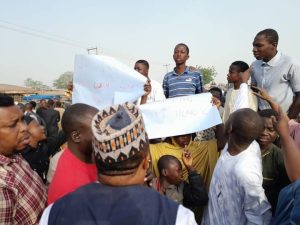
In a recent exchange of words, the ruling All Progressives Congress (APC) and the leading opposition party, the Peoples’ Democratic Party (PDP), clashed over the protests that took place simultaneously in Kano and Niger states on Monday.
The APC accused the PDP of orchestrating the demonstrations, alleging that they were part of a deliberate effort to undermine the APC-led administration. In a statement issued by the National Publicity Secretary of the APC, Felix Morka, the party claimed that the protests were not mere coincidence and were intended to portray the government as underperforming. Emphasizing the need for vigilance, the APC urged citizens not to fall for the opposition’s manipulative tactics, affirming the commitment of the President Bola Tinubu-led administration to implementing important reforms for economic recovery and prosperity.
In response, the Deputy National Publicity Secretary of the PDP, Ibrahim Abdullahi, mocked the APC, stating that governance comes with responsibility and consequences. He expressed concern over the state of the nation, highlighting issues such as the rising cost of living, insecurity, and the depreciation of the national currency. Abdullahi pointed out that in a democracy, it is normal for the opposition to criticize the ruling party, and he questioned the APC’s focus on the origin of the protests rather than addressing the underlying issues faced by the country.
Abdullahi further emphasized the dire situation the nation is facing, including high inflation, economic challenges, unemployment, and insecurity. He criticized the APC’s call for the opposition to keep quiet, stating that it is the responsibility of opposition parties to hold the government accountable and demand better governance.
The verbal exchange between the APC and the PDP reflects the ongoing tensions between the ruling and opposition parties regarding the state of the nation and the government’s performance. As Nigerians grapple with the hardships caused by economic policies and other challenges, the political landscape remains charged with differing perspectives on how to address these issues.

